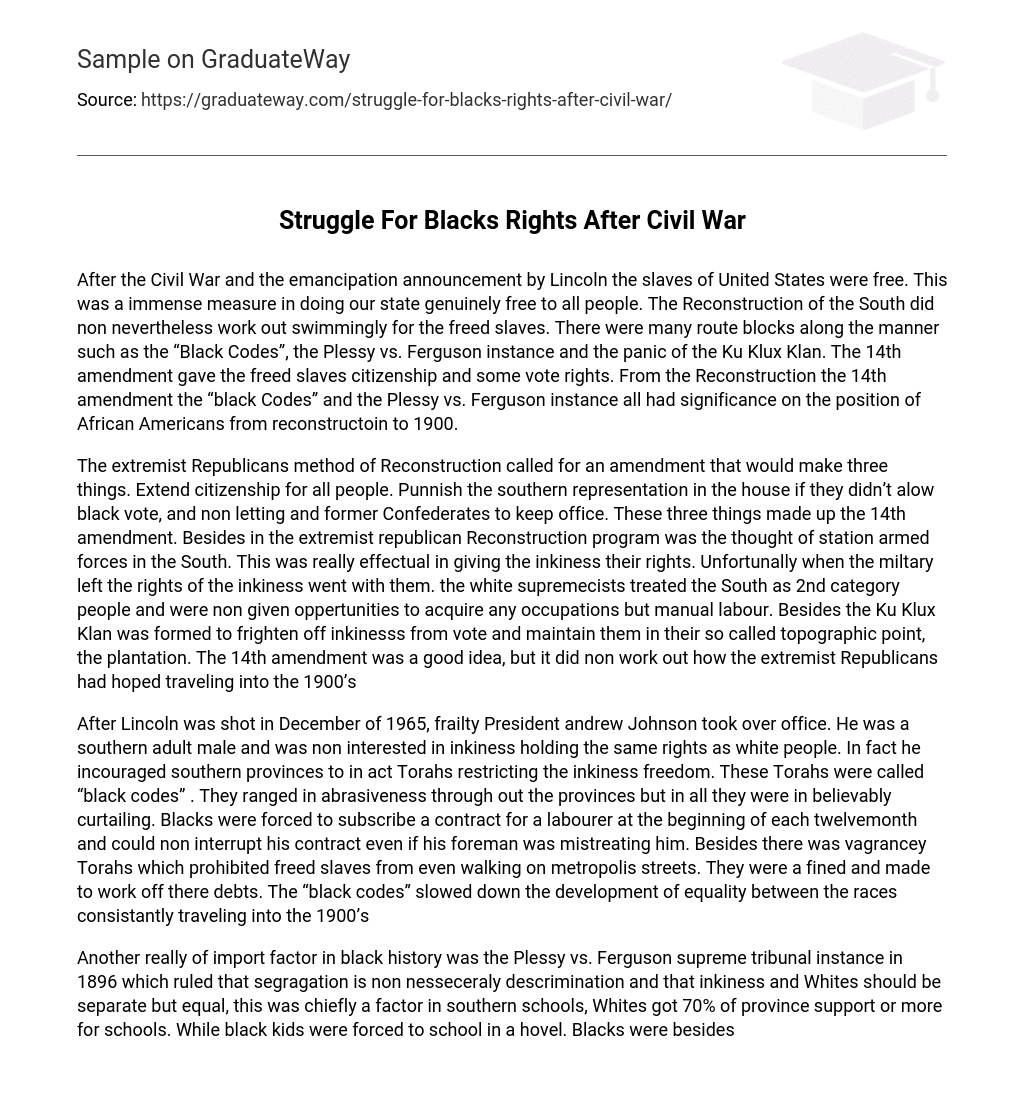After the Civil War and the emancipation announcement by Lincoln the slaves of United States were free. This was a immense measure in doing our state genuinely free to all people. The Reconstruction of the South did non nevertheless work out swimmingly for the freed slaves. There were many route blocks along the manner such as the “Black Codes”, the Plessy vs. Ferguson instance and the panic of the Ku Klux Klan. The 14th amendment gave the freed slaves citizenship and some vote rights. From the Reconstruction the 14th amendment the “black Codes” and the Plessy vs. Ferguson instance all had significance on the position of African Americans from reconstructoin to 1900.
The extremist Republicans method of Reconstruction called for an amendment that would make three things. Extend citizenship for all people. Punnish the southern representation in the house if they didn’t alow black vote, and non letting and former Confederates to keep office. These three things made up the 14th amendment. Besides in the extremist republican Reconstruction program was the thought of station armed forces in the South. This was really effectual in giving the inkiness their rights. Unfortunally when the miltary left the rights of the inkiness went with them. the white supremecists treated the South as 2nd category people and were non given oppertunities to acquire any occupations but manual labour. Besides the Ku Klux Klan was formed to frighten off inkinesss from vote and maintain them in their so called topographic point, the plantation. The 14th amendment was a good idea, but it did non work out how the extremist Republicans had hoped traveling into the 1900’s
After Lincoln was shot in December of 1965, frailty President andrew Johnson took over office. He was a southern adult male and was non interested in inkiness holding the same rights as white people. In fact he incouraged southern provinces to in act Torahs restricting the inkiness freedom. These Torahs were called “black codes” . They ranged in abrasiveness through out the provinces but in all they were in believably curtailing. Blacks were forced to subscribe a contract for a labourer at the beginning of each twelvemonth and could non interrupt his contract even if his foreman was mistreating him. Besides there was vagrancey Torahs which prohibited freed slaves from even walking on metropolis streets. They were a fined and made to work off there debts. The “black codes” slowed down the development of equality between the races consistantly traveling into the 1900’s
Another really of import factor in black history was the Plessy vs. Ferguson supreme tribunal instance in 1896 which ruled that segragation is non nesseceraly descrimination and that inkiness and Whites should be separate but equal, this was chiefly a factor in southern schools, Whites got 70% of province support or more for schools. While black kids were forced to school in a hovel. Blacks were besides forced to utilize different public bathrooms and water fountains. In 1890 2/3 of inkiness were illiterate in the USA. 60% of southern Whites won to schools and merely 35% of inkiness did. This shows that offprint was rarly equal. The separate but equal issue continued good into the twentieth century.
These three factors have been really of import in the development in inkiness in United States. How can still see the effects today. Merely 40 to 50 old ages ago inkiness were still forced to utilize different public toilets and H2O fountains.





